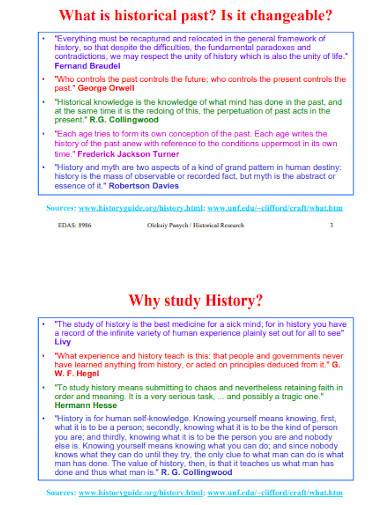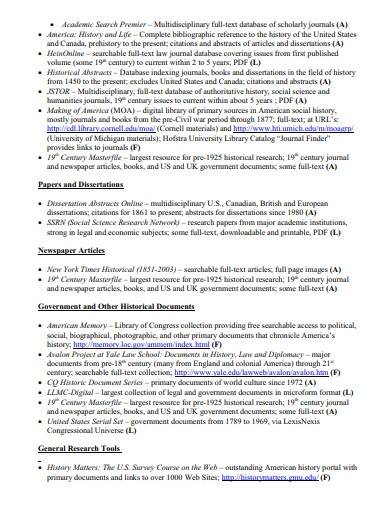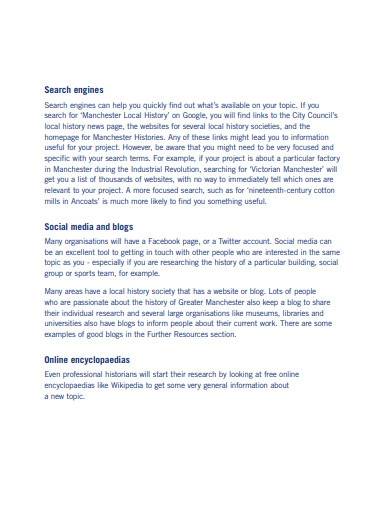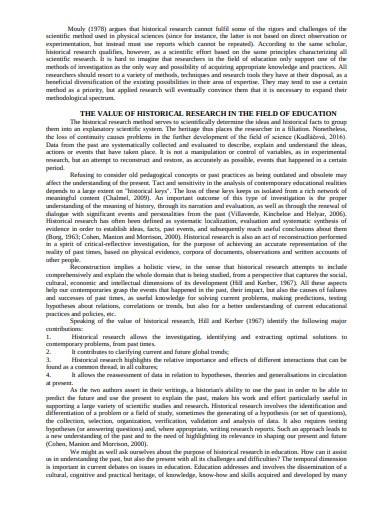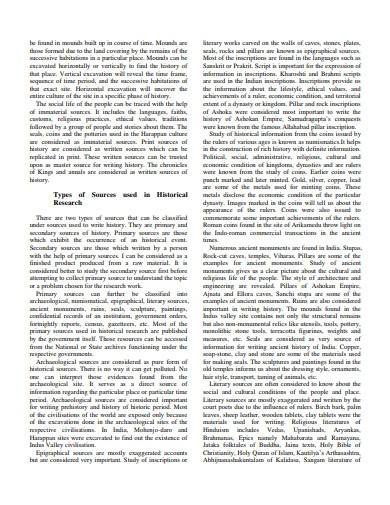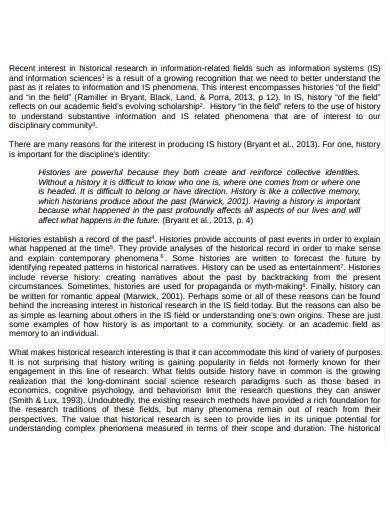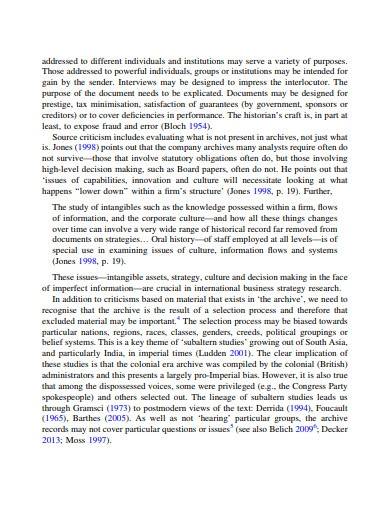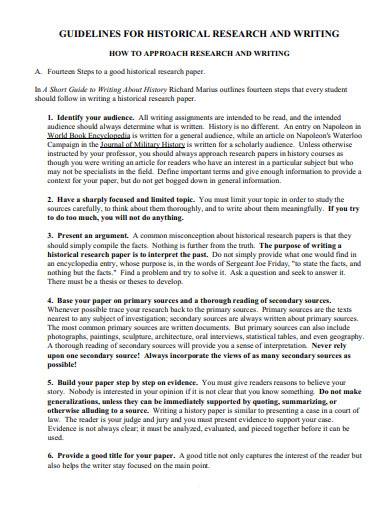History is the study of the past. We know about what happened during the time when we weren’t born yeta dn we record that things that took place in the past. We do this for the sake of furthering knowledge. History plays an important role in how we learn from our mistakes. That is because we can’t learn from mistakes that are bound to happen in the future, but we learn from the mistakes we commit from the past. Historical research helps us utilize and realize what we can take advantage of from the past. Learn about historical research using the samples and templates below.
FREE 7+ Historical Research Samples & Templates in PDF
1. Historical Research Template
2. Historical Research Study Template
3. Historical Project Research
4. Historical Research Method
5. Historical Data Research Template
6. IT Historical Research Template
7. Historical Research Analysis
8. Historical Research Guidelines
What Is Historical Research?
Historical research is a qualitative research technique that aims to find the relation of past events from that of the present. Data gathered in historical research is more primary historical data, which includes personal documents and records from witnesses, as well as accounts of events that are directly gathered from the source. Secondary historical data like textbooks, newspapers, encyclopedia, are also gathered, but it is done less frequently. The availability of primary and secondary historical data makes it possible for researchers to study the meaning of past events, what causes such events, interpret facts, and explain how they affect the future.
Just like in academic research, certain steps or methodology is followed to conduct historical research and create a reliable research paper properly. It is also subject to both internal and external criticism to ensure the validity of the sources and to explore their meaning. History is best understood when presented in chronological order, but simple chronology just doesn’t turn it into historical research. That is because it does not provide meaning or interpretation of events.
How to Make a Historical Research Paper
As mentioned above, historical research is subject to a lot of criticism, so you shouldn’t be surprised if your work gets heavily criticized. Just to let you know, there are as many ways to avoid heavy criticism as there are reasons to criticize a historical research report. Here are useful tips that can help you with it.
1. Pick a Topic
It’s important to point out the topic of your research before you actually start gathering the details. Choosing a good topic is not easy. It takes a lot of time and consideration. For that, you should choose a specific topic to cover for your research project. It should not be a huge or vague topic because it will bombard you with information, and your work will come out shallow. Another important thing to consider when picking a topic is that it must be something you are interested in. If you’re not interested in your topic, your audience won’t be interested in it, too.
2. Use a Writing Guide
If you don’t know what parts or sections to write or include in your historical research paper, then you’re better off with a writing guide or an outline. You can find different types of outline templates online or use the outline provided by your institution.
3. Use Resources Critically
It best to cross-check and investigate the reliability of your sources. For this, you can play detective and ask questions like who wrote the source, why they were it, when was the source written, for whom was it written, and under what circumstances was it written. There will always be two sides to a story, and as a historical researcher, you should not be satisfied with knowing only one side of it.
4. Provide an Analysis
Instead of providing a summary or an introduction to your research work, provide your analysis. Rather than just providing an overview, provide an interpretation of the information you have gathered by breaking them done into smaller topics. Smaller topics will be easier to explain and understand.
5. Precision Is Key
Your analysis should be specific and precise. If you fail to do this, then that means you really did not put enough effort into researching and learn about your topic. Avoid vague statements and generalizing ideas in your work.
6. Have a Clear Chronological Framework
Arrange your data chronologically and follow that order when you write your research report. A clear chronological framework allows you to thoroughly explain the things that happened in the past without jumping from one period to another period and then going back to a later period. It will mess up your audience’s understanding and comprehension of your work.
FAQs
What is the principal use of historical research?
We have learned a lot by studying and analyzing the events that took place in the past. It is perhaps one of the reasons why historical research is given importance in different fields of work, whether it be in the business industry or in medical innovations. The principal use of historical research is on the organization and preservation of historical data so that data will not get lost. From here, records of historical events are compared with the activities that surround the said events.
What are the advantages and disadvantages of historical research?
The good thing about historical research is that researchers are not involved in the event that is being studied. Researchers also do not interact with the identified subjects of the study. This means that they are kept safe from harm or injury. Another advantage of historical research is it helps in explaining current and future events through the analysis of past events. On the other hand, historical research can be biased and corrupt. Records that are needed for research may also be destroyed by wars or get lost over time. It can result in an incomplete research report.
If you need historical research samples and templates, you can download the samples we have provided above. They’re free and definitely easy to use. So, don’t forget to check them out!
Related Posts
FREE 10+ Concurrent Validity Samples & Templates in MS Word | PDF
FREE 10+ Resource Tracking Samples & Templates in MS Word | PDF
FREE 4+ Clinical Case Study Samples & Templates in PDF
FREE 10+ Content Validity Samples & Templates in PDF
FREE 10+ Construct Validity Samples & Templates in MS Word | PDF
FREE 10+ Code of Human Research Ethics Samples & Templates in MS Word | PDF
FREE 10+ Biography Research Report Samples and Templates in PDF
FREE 10+ System Documentation Samples & Templates in MS Word | PDF
FREE 10+ Process Document Samples & Templates in MS Word | PDF
FREE 10+ Action Research Samples & Templates in PDF
FREE 10+ Longitudinal Research Samples & Templates in PDF | MS Word
FREE 10+ Causal Research Samples & Templates in MS Word | PDF
FREE 10+ Client Discovery Samples & Templates in MS Word | PDF
FREE 10+ Null Hypothesis Samples & Templates in MS Word | PDF
FREE 9+ Product Knowledge Samples & Templates in PDF

